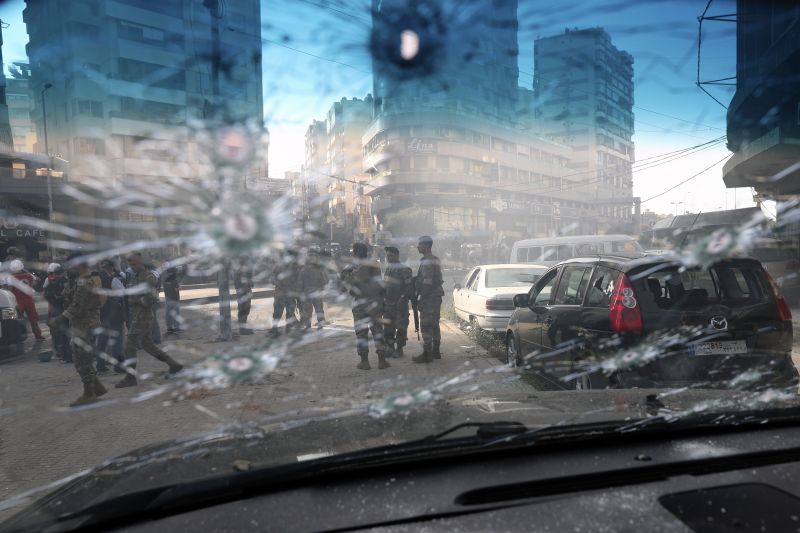
Armed clashes that suddenly broke out on Thursday between rival militias in Beirut evoked memories of Lebanon’s 15-year civil war: Snipers perched on rooftops fired on protesters, masked gunmen armed with machine guns and rocket-propelled grenades suddenly filled the streets, and young children cowered in the hallways of their schools.
The battle quickly took on sectarian undertones as Hezbollah, a Shiite Muslim militia backed by Iran and the most powerful faction in Lebanon, and its Shiite ally, the Amal Movement, blamed the Lebanese Forces, a right-wing Maronite Christian party, for instigating the fighting by using snipers. All three groups were major players in the civil war, which ended in 1990.
But that isn’t the only way this week’s clashes, which killed seven people and injured dozens, drew parallels with the civil war. One of the central legacies of the conflict — a general amnesty that allowed Lebanon’s sectarian militias and warlords to avoid responsibility for their crimes, divvy up public institutions and expand their patronage networks — has created a culture of impunity for Lebanon’s political elite. The same leaders and parties still retain power three decades after the war ended, and they have beat back every challenge to their authority, often by stoking sectarianism and the specter of renewed fighting.
The clashes come as the Lebanese state is crumbling under three interconnected crises: an economic collapse that the World Bank has said could rank among the three most severe in the world since the mid-1800s; political paralysis as the country’s sectarian parties continue to fight over spoils of a bankrupt system; and a stalled investigation into the massive explosion in the Beirut port in August 2020, which killed more than 200 people and caused billions of dollars in damage.
Since 2019, the Lebanese currency has lost more than 90 percent of its value, fueling hyperinflation and a shortage of dollars in a country heavily dependent on imports. In the summer, Lebanese lined up for hours trying to buy fuel, causing massive traffic jams and sometimes deadly fights at gas stations. In June, UNICEF found that 77 percent of households don’t have enough money to buy food. And earlier this month, Lebanon’s electricity grid was forced to shut down after two major power stations ran out of fuel.
Despite two years of on-and-off protests over the economic collapse, the greatest threat to the political elite today is Tarek Bitar, a judge in his mid-40s who rarely appears in public. Bitar is investigating why top Lebanese officials ignored warnings for years that 2,750 tons of ammonium nitrate were improperly stored in a warehouse at Beirut’s port until the stockpile caused one of the largest non-nuclear explosions in history.
The judge has tried, unsuccessfully, to question former Lebanese prime minister Hassan Diab, who resigned along with his cabinet a week after the port disaster. But then Bitar asked parliament to lift the immunity of three lawmakers who had served in previous governments: a former finance minister, Ali Hassan Khalil; a former interior minister, Nouhad Machnouk; and a former transportation minister, Ghazi Zaiter. The judge also wants to question two of the country’s most powerful security chiefs: Gen. Abbas Ibrahim, head of the General Security Directorate, and Gen. Tony Saliba, the head of State Security.
By targeting members of the political elite, Bitar poses an unprecedented threat to Lebanon’s post-civil war order built on amnesty and amnesia. He is seeking accountability in a country plagued by political interference that undermines the judicial system.
Most of Lebanon’s sectarian parties have mobilized to undercut the judge and his investigation. Over the past few weeks, Hezbollah leaders stepped up their criticism of Bitar and called for his removal. On Oct. 12, Bitar issued an arrest warrant for Khalil, a current member of parliament and top official of the Amal Movement, after he failed to show up for questioning. In response, Hezbollah and Amal called on their supporters to take to the streets on Thursday to demand the judge’s ouster after Lebanon’s highest court declined to dismiss him.
Unfortunately, the sectarian ghosts and fears of renewed civil strife unleashed in Beirut this week could hasten Bitar’s removal by allowing the country’s rulers to argue that the port investigation has contributed to instability and is a distraction from solving Lebanon’s multiple crises.
Never mind that the ruling clique has thwarted most reforms. In 2018, France, the former colonial power in Lebanon, convinced the World Bank and other donors to pledge $11 billion in loans and other aid. But Lebanese leaders have so far refused to meet Western demands for economic reform and transparency in Lebanon’s opaque central bank, whose policies helped instigate the economic collapse.
Today, the Lebanese are being offered a choice by the ruling parties and ex-warlords that have devastated their country: Forget accountability for the port explosion or risk all-out conflict on the streets. But this has been Lebanon’s false choice — between impunity and chaos — since the end of the civil war. The Lebanese compromised on accountability three decades ago, and yet their rulers have consistently failed to provide stability.
Mohamad Bazzi is a journalism professor and director of the Hagop Kevorkian Center for Near Eastern Studies at New York University. He is also a non-resident fellow at Democracy for the Arab World Now.
